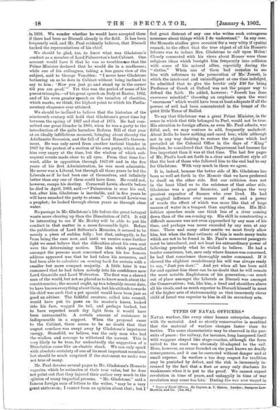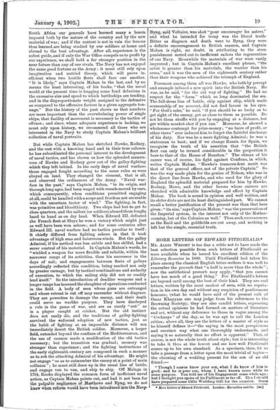TYPES OF NAVAL OFFICERS, NAVAL warfare, like every other human
enterprise, changes with its material. And so stoutly conservative is mankind that the material of warfare changes faster - than its tactics. The same characteristic may be observed in the pur- suits of peace : the railway, for instance, long hampered itself with waggons shaped like stage-coaches, although the form suited to the road was obviously ill-adapted to the -rail. Here, however, an error founded on the past knows no deadly consequences, and it can be corrected without danger and at small expense. In warfare a too deep respect for tradition may be punished by defeat, and the risk is immensely in- creased by the fact that a fleet- or army only discloses its weaknesses when it is put to the proof. We cannot expect revolution in time of peace, and unhappily in time of war revolution may come too late. Daring the war now waged in
* Types of Naval Officers. By Captain A. T. Mahan. London : SampsonLoa,
Marston, and Co. f1.0a. 6d.1 . •
South Africa our generals have learned many a leason imposed both by the nature of the country and by the new material of war; and if the contest is not in vain the lessons thus learned are being studied by our soldiers at home and abroad to the best advantage. After all, experience is the safest guide, and if only the War Office compels us to profit by our experience, we shall hold a far stronger position in the near future than any of our rivals. The Navy has not enjoyed the same good fortune as the Army : it must still rely upon imagination and untried theory, which will prove in- efficient when two hostile fleets shall face one another. " It is likely," says Captain Mahan in the last, and by no means the least interesting, of his books, " that the naval world at the present time is hugging some fond delusions in the excessive size and speed to which battleships are tending, and in the disproportionate weight assigned to the defensive as compared to the offensive factors in a given aggregate ton- nage." But the history of the past shows us that numbers are more important than the overwhelming power of single ships, that facility of movement is necessary to the tactics of offence ; and since, where adequate experience is lacking, we must rely upon history, we recommend all those who are interested in the Navy to study Captain Mahan's brilliant collection of naval portraits.
But while Captain Mahan has sketched Hawke, Rodney, and the rest with a knowing hand and in their true colours, he has subordinated the personal interest to the development of naval tactics, and has shown us how the splended mancen- vres of Hawke and Rodney grew out of the galley-fighting which they left behind. In the early days of naval warfare, those engaged fought according to the same rules as were obeyed on land. They changed the element, that is all, and observed the ordinances of the Army. " Naval war- fare in the past," says Captain Mahan, " in its origin, and through long ages, had been waged with vessels moved by oars, which consequently, when conditions permitted engaging at all, could be handled with a scope and freedom not securable with the uncertain factor of wind." The fighting, in fact, was primitive and bloodthirsty. Two ships bad but to get to close quarters, and the sailors (or soldiers) aboard them fought hand to hand as on dr7 land. When Edward III. defeated the French fleet at Slays he won a victory which might just as well have been won ashore ; and for some centuries after Edward III. naval warfare had no tactics peculiar to itself : it chiefly differed from fighting ashore in that it took advantage of high seas and boisterous winds. But the galley Admiral, if his method was less subtle and less skilful, had a surer control of his material. In Captain Mahan's words, he "wielded a weapon far more flexible and reliable, within the narrower range of its activities, than his successor in the days of sail; and engagements between fleets of galleys accordingly reflected this condition, being marked not only by greater carnage, but by tactical combinations and audacity of execution, to which the sailing ship did not so readily lend itself." So the introduction of deadlier weapons and a longer range has lessened the slaughter of operations conducted in the field. A body of men whose guns are outranged and whose retreat is cut off may surrender without disgrace. They are powerless to damage the enemy, and their death could serve no warlike purpose. They have disobeyed a rule in the game of war, and are as surely "out" as is a player caught at cricket. But the old instinct does not easily die, and the traditions of galley-fighting survived the enforced adoption of new tactics, just as the habit of fighting at an impossible distance will not immediately desert the British soldier. Moreover, a larger field, extended beyond the confines of the Mediterranean, and the use of cannon made a modification of the old tactics necessary; but the transition was gradual; memory was stronger than experience ; and the fighting instructions of the early eighteenth century are composed in such a manner as to rob the attacking Admiral of his advantage. He might not engage " so as to outnumber the enemy at a point of main collision" ; he must still draw up in the usual line of battle, and engage van to van, and ship to ship. Off Malaga in 1704, Rooke displayed the common form of inefficient naval action, as Captain Mahan points out, and had it not been for the palpable negligence of Matthews and Byng, we do not know when reform would have been introduced into the Navy.
Byng, said Voltaire, was shot "pour encourager les autres," and what he intended for irony was the literal truth• Bitter as disgrace and death were to Byng, they were a definite encouragement to British seamen, and Captain Mahan is right, no doubt, in attributing to the stern punishment meted out to inefficient sailors the regeneration of our Navy. Meanwhile the materials of war were vastly improved ; but in Captain Mahan's excellent phrase, "the artist is 'greater than his materials, the warrior than his arms," and it was the men of the eighteenth century rather than their weapons who achieved the triumph of England.
Foremost among them all was Hawke, who both by precept and example infused a new spirit into the British Navy. He was, as he said, " for the old way of fighting." He had no respect for the " form " which so long dominated the sea. The full-dress line of battle, ship against ship, which made seamanship of no account, did not find favour in his eyes. " For God's sake," he said, " if you should be so lucky as to get sight of the enemy, get as close to them as possible. Do not let them shuffle with you by engaging at a distance, but get within musket-shot if you can." Moreover, he showed a wholesome contempt for prize-money; "no lucre of profit, or other views" ever induced him to forget the faithful discharge of his duty. Nor was he a mere fighting Admiral; he was a statesman to boot; and if we change Russia for Spain, we recognise the truth of his assertion that " the British fleet can only be termed considerable in the proportion it bore to that of the House of Bourbon." The climax of his career was, of course, his fight against Conflans, in which, writes Captain Mahan, " Hawke's transcen dent merit was that of the general officer, not of the private Captain." So was the way made plain for the genius of Nelson, who was in the erect line from Hawke, and who used for the glory of England the splendid material prepared for him by Hawke, Rodney, Howe, and the other heroes whose careers are sketched with admirable knowledge and effect by Captain Mahan. The book is sound in opinion and well written, and its obiter dicta are not its least distinguished part. We cannot recall a better justification of the present war than that here given : " its aim," says Captain Mahan," was the preservation of the Imperial system, in the interest not only of the Mother- country, but of the Colonies as well." Thus such excrescences as the Raid and the goldfields are cut away, and nothing is left but the simple, essential truth.







































 Previous page
Previous page